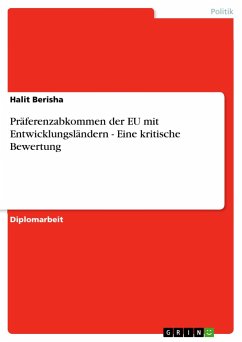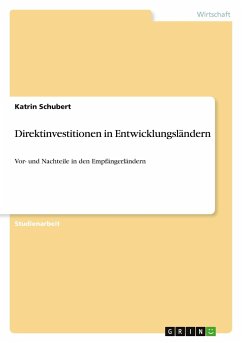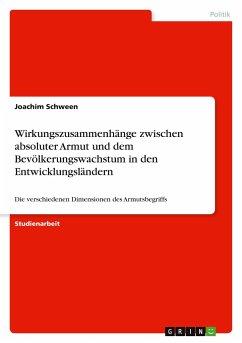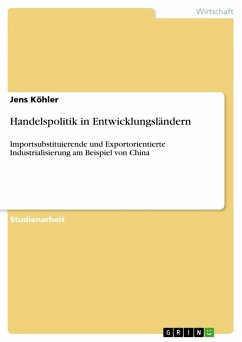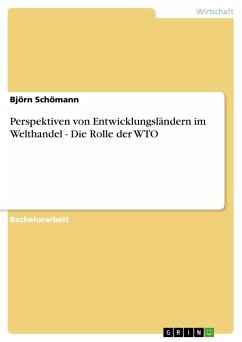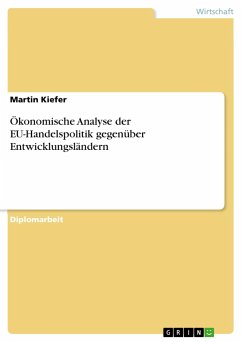
Ökonomische Analyse der EU-Handelspolitik gegenüber Entwicklungsländern

PAYBACK Punkte
0 °P sammeln!
Diplomarbeit aus dem Jahr 2002 im Fachbereich VWL - Außenhandelstheorie, Außenhandelspolitik, Note: 2,0, Ruprecht-Karls-Universität Heidelberg (Alfred-Weber-Institut), Sprache: Deutsch, Abstract: Zusammenfassung: Diese Arbeit bietet einen Überblick über die handelspolitischen Instrumente, die die Europäische Union gegenüber Entwicklungsländern einräumt. In unterschiedlichen Programmen gewährt die EU wie auch andere Industrienationen den Volkswirtschaften der Dritten Welt Zollpräferenzen und andere Handelserleichterungen. Nachdem kurz die historische Entwicklung der wesentlichen Prä...
Diplomarbeit aus dem Jahr 2002 im Fachbereich VWL - Außenhandelstheorie, Außenhandelspolitik, Note: 2,0, Ruprecht-Karls-Universität Heidelberg (Alfred-Weber-Institut), Sprache: Deutsch, Abstract: Zusammenfassung: Diese Arbeit bietet einen Überblick über die handelspolitischen Instrumente, die die Europäische Union gegenüber Entwicklungsländern einräumt. In unterschiedlichen Programmen gewährt die EU wie auch andere Industrienationen den Volkswirtschaften der Dritten Welt Zollpräferenzen und andere Handelserleichterungen. Nachdem kurz die historische Entwicklung der wesentlichen Präferenzschemata dargestellt wurde, geht der Autor auf die aktuelle Ausgestaltung der Handelsvorteile ein. Besonderes Gewicht liegt auf der Darstellung des Allgemeinen Präferenzsystems sowie der Kooperation der Gemeinschaft mit den AKP-Staaten im Rahmend er Verträge von Lomé. Im Anschluss an diese Beschreibung des Ist-Zustandes wird analysiert werden, inwiefern die einzelnen Programme aus Sicht der Entwicklungsländer effektiv sind. Dabei werden sowohl ökonomische Argumente wie auch empirische Ergebnisse vorgetragen. Sie alle nähren Zweifel an der Wirksamkeit der Maßnahmen. Die Arbeit bildet den Abschluss des volkswirtschaftlichen Studiums des Autors und entstand von Dezember 2001 bis April 2002. Die Bewertung steht zum Zeitpunkt der Veröffentlichung noch aus.
Abstract
This Paper provides an overview upon instruments of trade policy used by the European Union to benefit developing countries. Within different programs the Community - alike other industrial countries - offers tariff preferences as well as other trade commitments to the nations of the Third World. Having presented the historical progress of the main schemes in brief, the author describes the current situation of preferential treatment. Special highlights will be set on the Generalized System of preferences ant the EU-ACP cooperation within the process of Lomé-Conventions. Following this description of status quo, theeffectiveness of the respective schemes will be analyzed from the LDCs point of view. Thereby economic arguments as well as empirical evidence are drawn. All of this leads to at least some strong doubts on the effectiveness of the respective preferences. The paper was written from December of 2001 until April of 2002 and finishes the economic studies of the author. By now the results are not available.
Abstract
This Paper provides an overview upon instruments of trade policy used by the European Union to benefit developing countries. Within different programs the Community - alike other industrial countries - offers tariff preferences as well as other trade commitments to the nations of the Third World. Having presented the historical progress of the main schemes in brief, the author describes the current situation of preferential treatment. Special highlights will be set on the Generalized System of preferences ant the EU-ACP cooperation within the process of Lomé-Conventions. Following this description of status quo, theeffectiveness of the respective schemes will be analyzed from the LDCs point of view. Thereby economic arguments as well as empirical evidence are drawn. All of this leads to at least some strong doubts on the effectiveness of the respective preferences. The paper was written from December of 2001 until April of 2002 and finishes the economic studies of the author. By now the results are not available.




